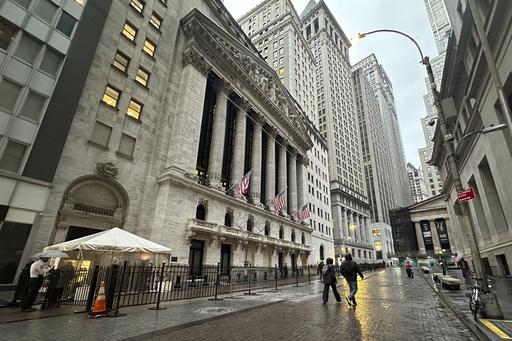
BANGKOK — Asian markets were mixed on Wednesday after U.S. stocks reached record highs, despite concerns over President-elect Donald Trump’s recent tariff discussions, which seemed to have minimal impact on Wall Street.
Japan’s Nikkei index saw a drop of nearly 1%, settling at 38,081.10, as the Japanese yen strengthened against the U.S. dollar, which decreased to 152.31 yen from 153.08 yen. The dollar had recently traded above 155 yen, but the uncertainty surrounding U.S. trade policies has prompted investors to turn to yen as a safer option, according to analysts.
Trump’s proposals for significant tariff increases on imports from Canada, Mexico, and China have the potential to disrupt the global economy if enacted. His remarks on Monday spurred intense responses from these key trading partners.
Stephen Innes of SPI Asset Management expressed in a commentary that investors are particularly anxious about the extended disputes, especially considering their potential impact on the economies of China and Europe, which are both preparing for the implications of Trump’s proposed tariffs.
In South Korea, the Kospi index fell by 0.6% to 2,505.49, with Samsung Electronics dropping 3.3% following a change in top management. The company announced that Young Hyun Jun, a vice chairman who leads Samsung’s Device Solutions division, would take over as CEO in a move aimed at enhancing the company’s competitiveness, especially in the computer chips sector.
Conversely, Chinese markets performed well with Hong Kong’s Hang Seng index increasing by 0.5% to 19,259.77, and the Shanghai Composite gaining 0.7% to 3,283.55. Meanwhile, Australia’s S&P/ASX rose by 0.5% to 8,400.10. India’s Sensex saw a slight decrease of 0.1%, while Taiwan’s Taiex dropped 1.4%, and Thailand’s SET index declined by 0.6%.
Despite the uncertainty surrounding trade, Wall Street investors appeared unfazed. The S&P 500 climbed by 0.6% on Tuesday, reaching a new all-time high of 6,021.63. The Dow Jones Industrial Average edged up by 0.3% to 44,860.31, surpassing its record from the previous day, and the Nasdaq composite rose by 0.6% to close at 19,174.30, buoyed by strong performances from tech giants like Microsoft and others.
Trump has frequently lauded tariffs, but investors are left speculating whether his latest threats will be used as leverage for negotiations or will turn into actual policy, which could have detrimental effects on markets and the global economy.
Economists Carl Weinberg and Rubeela Farooqi from High Frequency Economics warned that without alternative supplies for autos, energy products, and other imports from Mexico, Canada, and China, imposing such tariffs would immediately inflate prices for consumers, negatively affecting households.
Goldman Sachs has predicted that these tariffs could lead to a 1% rise in consumer inflation. Additionally, they could reduce profit margins for U.S. businesses and heighten the risk of retaliatory tariffs from other nations.
General Motors saw a substantial drop of 9%, while Ford Motor fell by 2.6%, as both companies rely on automobiles assembled in Mexico. Constellation Brands, which sells various Mexican beers in the U.S., experienced a decline of 3.3%. The Mexican peso weakened by 1.8% against the dollar as a result.
The potential for higher prices may lead the Federal Reserve to reconsider its plans for interest rate cuts, just after initiating a reduction from a two-decade high a few months prior to stimulate the job market. Lower interest rates tend to foster economic growth but can simultaneously contribute to inflation.
On Tuesday, a report from the Conference Board indicated a slight improvement in consumer confidence in the U.S. for November, although it fell short of economists’ expectations.
Retailer Kohl’s faced a significant drop of 17% after reporting quarterly results that did not meet analyst expectations, and Best Buy also fell by 4.9% for the same reason.
Tech stocks provided support to U.S. indices, with Amazon gaining 3.2% and Microsoft up by 2.2%, both contributing heavily to the S&P 500’s performance.
In early trading on Wednesday, U.S. benchmark crude oil prices rose by 12 cents, reaching $68.89 per barrel, with Brent crude increasing by 11 cents to $72.43. The euro experienced a dip to $1.0479 from $1.0488.
